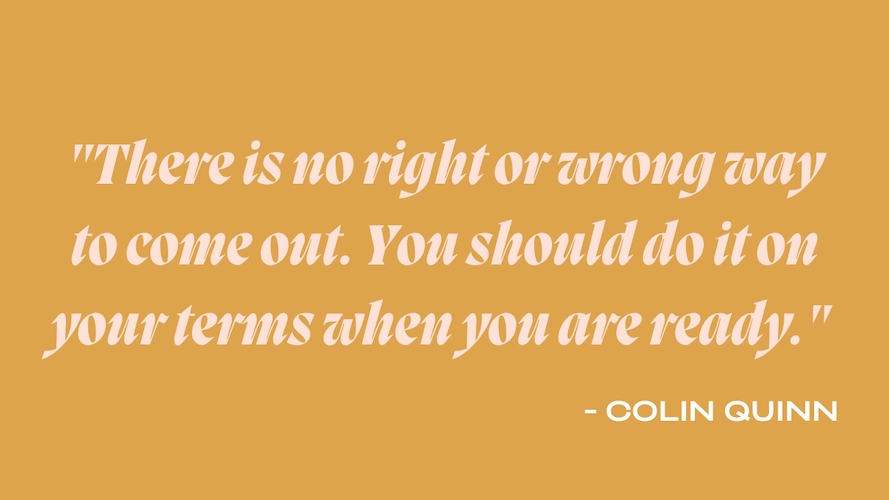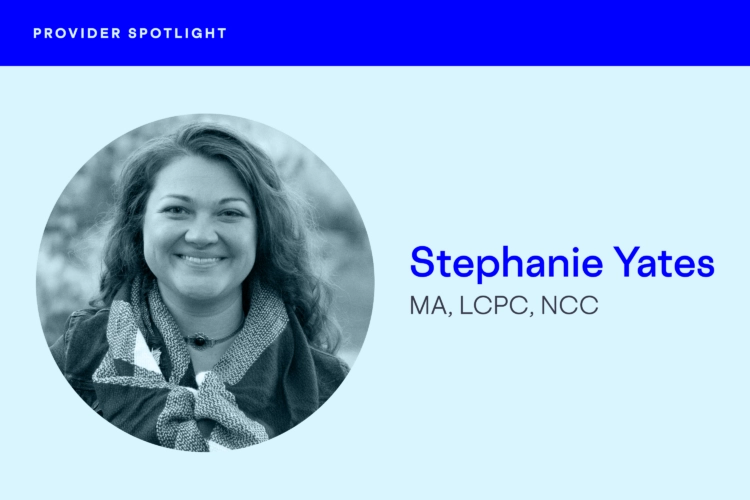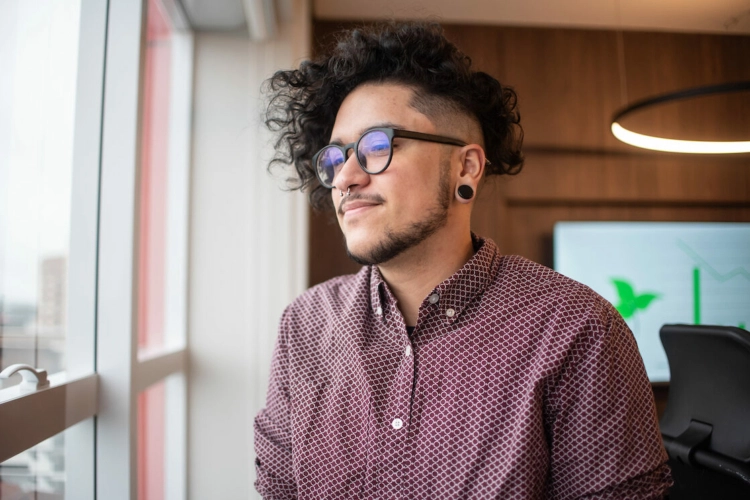Today, October 11th, is National Coming Out Day, which is the day that we celebrate those in our community who have come out. This year marks the 34th National Coming out day, which started on the anniversary of the October 11, 1987 National March in Washington for Lesbian and Gay rights.
For me, National Coming Out Day is important for 3 reasons:
- Coming Out takes courage, so we want to celebrate those who have taken the leap to be out and proud living their true authentic life.
- It is a reminder of our own personal journeys and the difficulty that some in our community have had in their coming out process. Unfortunately, there are still many individuals in our community who are not out to their family, friends, or coworkers for the fear of what it may do to their relationships or career. We are here to show our support for those who have not had a chance to come out yet and remind them that they are loved and we are here to support them. As a reminder, there is no right or wrong way to come out. You should do it on your terms when you are ready.
- It is an opportunity to educate those around us and encourage active allyship. Unbeknownst to many of you reading this, you are likely to have a profound impact on someone in your life’s ability to comfortably come out and/or continue living as their true authentic self. While it might seem like a small effort on your part, I guarantee that by being an active ally, respecting a person’s pronouns, and creating a safe, welcoming environment you will have a significant impact on that other person’s life. I am speaking from my own personal experience!
It is time we spread more good and happiness in our world, so I welcome everyone to join me 🙂
Below you will find a coffee chat Q&A between me and Elly Belle (they/them), a trans non-binary employee who leads communications for Included Health Communities. I welcome you to read our chat where Elly asks me about my story and the importance that workplace culture can play in the coming out process.
Coffee Chat Q&A
with Colin Quinn (he/him) and Elly Belle (they/them)
Elly Belle: Colin, it’s been so wonderful to see an out and proud gay man doing such crucial work for LGBTQ+ people, and it’s been wonderful to be on a team with you. Can you tell me about when you first came out and what your journey was like?
Colin Quinn: I love how you said the word “journey” to describe the coming out process, because for me that’s exactly what it’s been. It was a very LONG journey for me just to initially come out and for many in our community it never quite ends as we’re having to constantly come out to new people in our worlds (jobs, friends, doctors, etc). I didn’t fully come out until my mid to late 20’s. I always knew there was something different about me, but I really struggled with my identity and sexuality growing up. I grew up in conservative areas (the Midwest and the South), in a Catholic family with traditional values, and I didn’t know anyone gay or part of the queer community, at least not that I was aware of. My only connection to what what it meant to be gay was what society told me on TV or what my friends or family might say. Unfortunately most of the time it came in the form of an insensitive gay joke. Because of this, I let my surroundings dictate who I was supposed to be versus letting me be me. I simply didn’t allow myself to think about or even explore who I was. I remember praying most nights asking God to not let me be gay because I was taught there was something wrong with that. (Thankfully God didn’t listen to me! 🙂
It wasn’t until I gained more self confidence and moved out to California for business school that I finally started allowing the real Colin to emerge. I recall reading a social medial post that captures this section perfectly: “As queer people, we don’t grow up as ourselves. Rather we grow up playing a version of ourselves that sacrifices authenticity to minimise humiliation & prejudice. Then we spend most of our adult lives figuring out and unpacking which parts of ourselves are truly us versus which parts we’ve created to protect us.”
EB: Well we’re glad the real Colin emerged, too! You talked about how the environment that you grew up in really shaped your initial perceptions of who you “should” be. What concerned you most about coming out?
CQ: While there were many things I was worried about, the two that worried me the most were how my coming out would affect my relationships with family and friends and what it would mean for my professional career. I had myself convinced that I would lose close friends and potentially cause a serious divide within my family. As I mentioned, I grew up Catholic and in a rather conservative area so the idea of being gay was not something people talked about. As a result of this fear of losing family and/or friends, I found myself distancing and detaching myself from those closest to me. After a few years of this and nearly jeopardizing important relationships, I finally came to terms with myself that it’s time that I live openly as my true authentic self and if my friends or family cannot accept me for who I am, that’s their problem not mine. Luckily, when I did come out, those who mattered the most are still there by my side today. Some were excited and cheerful about it, whereas others were accepting but would take them some time to process and understand. Just like my coming out was a journey, I realized that it would be a journey for my parents as well. I consider myself extremely lucky to have such a supportive family because there are many in our community who are not so lucky.
EB: You mentioned work culture playing a significant role in your coming out at work experience. Can you share more?
CQ: As I mentioned, I was concerned about what might happen to my professional career if or when I came out. I wondered if I would be treated differently, get passed over for projects or promotions, or even get pushed out of networking circles. Despite being at a Fortune 500 company with 40,000 global employees (approximately 15,000 at our headquarters), there weren’t any known or visible queer leaders. Without having that visible role model or leader providing assurance that it is possible to be gay AND have a successful career within the company, I felt significant uncertainty about what might happen to my career trajectory. Shortly after coming out to my family and friends, my next step was to come out at work. I had it all planned out to tell my boss during our 1:1 then slowly start telling my coworkers.
Finally, the day of my 1:1 had come. I still remember how nervous and excited I was that day. I got into work early and went on about my morning routine as naturally as I could but found myself having a hard time concentrating in anticipation of sharing my news. My 1:1 was in the early afternoon, so I just needed to get through lunchtime. To give myself a little distraction, I decided to get lunch with a couple of the guys in our department. While at lunch the guys were bantering with one another. First talking shop, then sports, then it switched over to a few harmless jokes, but then there was a gay joke that then led to another and another. I was devastated. My mood changed immediately, and I put a halt to my plans of coming out that day. As a result, I continued to stay “closeted” at work even though I was out to some friends and family. By the way, this isn’t uncommon: 43% of LGBTQ+ people are not out at work despite being out to some people in their social circles.
I had given up on the idea of coming out at work indefinitely until our quarterly town hall meeting, where our functional Vice President, a conservative no nonsense kind of a guy, was telling a story about his support for the community and why he believed it to be so important to be an ally. I was shocked and surprised. I never expected to hear him say those words or much less be an ally of the community. Now that I knew I would have his support, I had the confidence I needed to comfortably come out at work.
EB: That’s such an important story. Can you talk more about why creating an inclusive culture where people feel safe to be their open, authentic self is so important?
CQ: It affects everything – creativity, job satisfaction, productivity, talent acquisition & retention and profitability! We want everyone bringing their whole self to work so we can all be at our best. BCG and the Williams Policy Institute published their respective studies showing the negative impacts of not having an inclusive workplace:
- 40% less productive
- 13x more likely to quit
- Less creativity and team collaboration
- 2/3 of LGBTQ+ employees have experienced negative comments, slurs, or jokes casually being mentioned by co-workers
Creating a consistent inclusive culture starts with how we speak to and treat people—how we react when they come out, what language we use in conversations regardless if we know someone’s gender identity, sexual orientation, background, etc. Creating an inclusive culture is about making people feel safe and welcome to show up as themselves and fostering an environment of respect and care for those around us.
EB: What recommendations do you have for those looking to be part of creating and fostering a more inclusive work environment?
CQ: Great question! I get asked this all the time and I love having the opportunity to partner with our clients and others looking to make a positive impact on culture. Below are a couple things to consider:
- Allyship – support and foster a space for allies
- Benefits – review your HR benefits offering to ensure all your employees are able to access the benefits you offer and that they’re equitable for everyone
- Employee Resource Groups (ERG) – have ERG’s and support them! I always encourage our HR and HR Benefits colleagues to be an active member in their company’s ERG’s and have regular meetings with the ERG leaders to understand what’s working well and what could be improved.
- Gender Language – removing gendered language in work settings as much as possible (e.g. ma’am, sir, miss, mr, ladies, gentleman, etc… After 40 seasons of Survivor, the host Jeff Probst has stopped saying “You guys” for this reason)
- Pronouns – allow people to list their pronouns to their email signatures and internal systems. Also, when you’re meeting people for the first time, introduce yourself with your pronouns, such as: “Hi my name is Colin. I use he/him pronouns.” This is to ensure your pronouns are respected, but more importantly as a leader you create a safe space for others.
- Training – provide manager and supervisory cultural awareness training
At Included Health, we strive to provide friendly and exceptional healthcare service to the LGBTQ+ community. Become a member today to receive more health and well-being updates from our care team. And please do not hesitate to contact us to #GetIncluded for your company, health plan, and community.
About the author
Editorial Team
Our Editorial Team is composed of our leaders, clinicians, and care coordinators, as well as other Included Health employees, all who are working to raise the standard of healthcare for everyone. Together, they combine decades of subject matter experience across all fields of healthcare.



